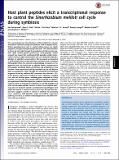Host plant peptides elicit a transcriptional response to control the Sinorhizobium meliloti cell cycle during symbiosis
Author(s)
Penterman, Jon; Abo, Ryan; De Nisco, Nicole J.; Arnold, Markus F. F.; Walker, Graham C.; Longhi, Renato; Zanda, Matteo; ... Show more Show less
DownloadPenterman-2014-Host plant peptides.pdf (977.9Kb)
PUBLISHER_POLICY
Publisher Policy
Article is made available in accordance with the publisher's policy and may be subject to US copyright law. Please refer to the publisher's site for terms of use.
Terms of use
Metadata
Show full item recordAbstract
The α-proteobacterium Sinorhizobium meliloti establishes a chronic intracellular infection during the symbiosis with its legume hosts. Within specialized host cells, S. meliloti differentiates into highly polyploid, enlarged nitrogen-fixing bacteroids. This differentiation is driven by host cells through the production of defensin-like peptides called “nodule-specific cysteine-rich” (NCR) peptides. Recent research has shown that synthesized NCR peptides exhibit antimicrobial activity at high concentrations but cause bacterial endoreduplication at sublethal concentrations. We leveraged synchronized S. meliloti populations to determine how treatment with a sublethal NCR peptide affects the cell cycle and physiology of bacteria at the molecular level. We found that at sublethal levels a representative NCR peptide specifically blocks cell division and antagonizes Z-ring function. Gene-expression profiling revealed that the cell division block was produced, in part, through the substantial transcriptional response elicited by sublethal NCR treatment that affected ∼15% of the genome. Expression of critical cell-cycle regulators, including ctrA, and cell division genes, including genes required for Z-ring function, were greatly attenuated in NCR-treated cells. In addition, our experiments identified important symbiosis functions and stress responses that are induced by sublethal levels of NCR peptides and other antimicrobial peptides. Several of these stress-response pathways also are found in related α-proteobacterial pathogens and might be used by S. meliloti to sense host cues during infection. Our data suggest a model in which, in addition to provoking stress responses, NCR peptides target intracellular regulatory pathways to drive S. meliloti endoreduplication and differentiation during symbiosis.
Date issued
2014-02Department
Massachusetts Institute of Technology. Department of BiologyJournal
Proceedings of the National Academy of Sciences
Publisher
National Academy of Sciences (U.S.)
Citation
Penterman, J., R. P. Abo, N. J. De Nisco, M. F. F. Arnold, R. Longhi, M. Zanda, and G. C. Walker. “Host Plant Peptides Elicit a Transcriptional Response to Control the Sinorhizobium Meliloti Cell Cycle During Symbiosis.” Proceedings of the National Academy of Sciences 111, no. 9 (February 5, 2014): 3561–3566.
Version: Final published version
ISSN
0027-8424
1091-6490